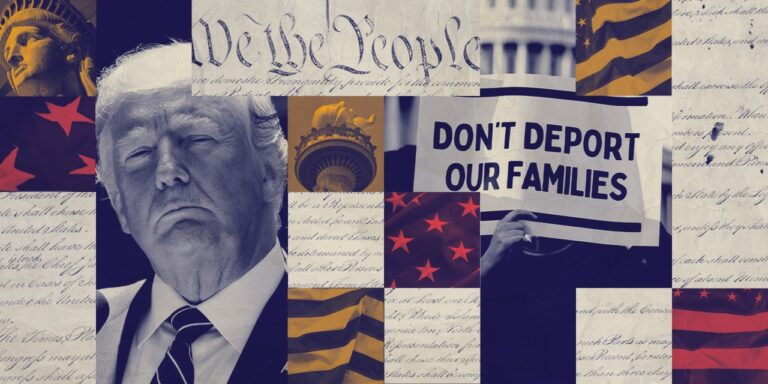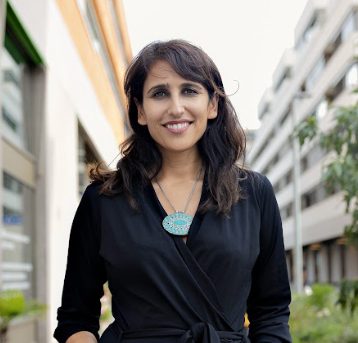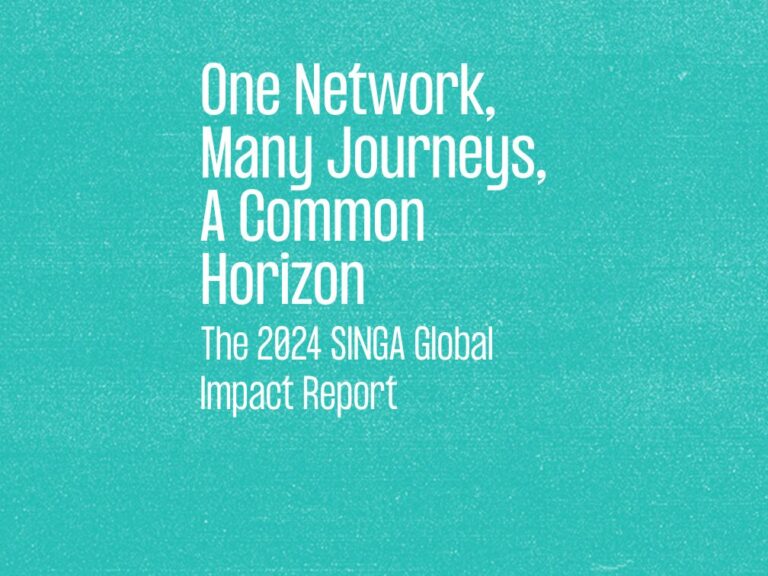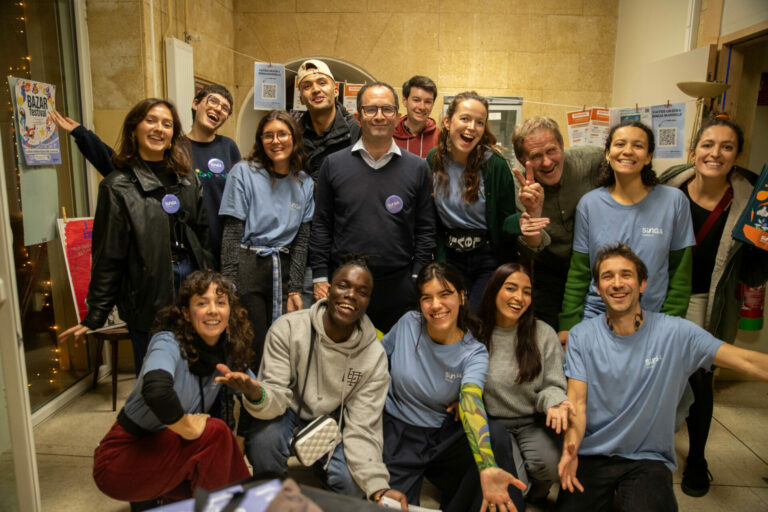- About
- SINGA in the world
- Entrepreneurship
- Intercultural encounters
- Training and information
Unity or Division: The EU’s High-Stakes Stance on Migration in a Trump-Led Era

The way we respond to those at our borders defines who we are within them. Migration is not simply policy; it reflects our collective values and the strength of our democracies. As the daughter of immigrants who fled Soviet-invaded Afghanistan and as someone dedicated to the inclusion of displaced people, I know firsthand that migration mirrors our global condition. Our treatment of the most vulnerable reflects the health of our democracies, sense of security, and our shared future.
With Election Day approaching, the stakes couldn’t be higher. Should Donald Trump return, the fallout would reverberate far beyond, threatening the stability of the EU, and the future of our world.
Weaponizing Migration for Political Gain
During his first presidency, Trump turned immigration into a divisive tool. His administration separated families, banned people from Muslim-majority countries, and weakened asylum protections, reducing migrants to political fodder. A second Trump term would solidify this harmful narrative, framing migrants as threats and further dehumanizing them.
In the EU, migration is already contentious. Nationalist parties have long used exclusionary rhetoric to feed fear and justify stricter borders. Today, this rhetoric increasingly shapes policy as other parties increasingly yield for political gains. Trump’s influence would further embolden those who see migration as a means to divide society and impose barriers that risk dismantling the EU’s founding principle: solidarity.
Normalizing Exclusion to Divide in Diversity
What was once the EU’s rallying call—united in diversity—is now at risk. Democratic values face a stark test tied directly to the treatment of migrants. Beyond the countless migrants left stranded or lost in the Mediterranean, political parties continue to harden their stance on migration, undermining the principles of solidarity and respect for the individual, without which democracy is nothing but an empty shell.
In Hungary, Viktor Orbán has labeled migrants as threats, while opportunistically accepting migrant labor to address economic needs. Poland’s center-right government under Donald Tusk supports Ukrainian refugees but brands non-Europeans as security risks with questionable pushbacks. In France, Marine Le Pen’s party recently proposed a sub-citizenship category, while its current Prime Minister is known to have previously defended a moratorium on non-European migration.
Even traditionally progressive Scandinavia is tightening immigration policies. Denmark’s Social Democrats restrict non-Western residents, while Sweden’s ruling party recently proposed a law requiring public employees to report undocumented immigrants. These are just a few examples from a growing web of hairline tactics, representing a shift toward exclusionary norms, echoing Europe’s darker past and threatening the social contracts upon which the EU stands. If the EU cannot uphold its values, authoritarian leaders like Vladimir Putin, waiting on the sidelines, are poised to exploit these fractures.
A Trump-Putin Threat to Peace
This isn’t just about values—peace and security are also at risk. Trump’s questioning of NATO’s relevance during his first term emboldened adversaries like Putin. A second Trump term could deepen U.S. disengagement from NATO, leaving Europe exposed, especially to Putin who has taken the weaponization of migration a notch further through orchestrated border crises. By moving refugees from Belarus into Poland and Lithuania, Putin continues to sow chaos, further fueling anti-immigrant sentiment across Europe in tandem with his disinformation war.
A Trump comeback would be a strategic boon for Putin. His reluctance to hold him accountable for Ukraine or his calculated cyber-attacks has already granted Putin considerable leverage. Further U.S. withdrawal from NATO would give Putin even more freedom to consolidate power in Eastern Europe, fracturing Western security alliances. This drift, coupled with Trump’s engagement with Elon Musk, a major player in U.S. security, signals a chilling message to Europe: it may need to navigate future security challenges without reliable U.S. backing.
An Influence Bigger than Politics
While Musk amplifies pro-Trump narratives on his platform, X, his influence extends far beyond social media. His satellite technology, such as Starlink, has been crucial for Ukraine, providing secure communication in its defense against Russia. Within this scope, Musk’s conversations with Putin become all the more alarming as it risks undermining the security of countries like Ukraine, as well as others who depend on his technologies.
Unfortunately his breadth of influence does not just stop there. Musk’s financial offerings to influence voter sentiment—as seen in Pennsylvania—not only deepen societal divides but also undermine democratic norms. Even more troubling, his influence extends beyond the present, positioning him in a Trump government to potentially disregard ethical boundaries in shaping future defense, technology, and even space exploration frameworks.
Standing Without Its Historical Ally
Europe and the U.S. are historically intertwined, each relying on the other’s stability. George C. Marshall understood this interdependence, urging the U.S. to ‘assist in the return of normal economic health in the world, without which there can be no political stability and no assured peace.’ Nearly eight decades since the Marshall Plan, U.S. stability still remains crucial to Europe’s security and peace. In a few days, Europe could potentially find itself isolated against rising authoritarianism and Putin’s escalating aggressions. German Defense Minister Boris Pistorius’s call to prepare for war by 2029 grimly underscores the threat. The EU will need to brace itself by drawing strength from its founding values and rallying its citizens to face these growing threats together.
An Urgent Call for Unity
At this critical moment, Europe cannot turn its back on migration, democracy, or security against Putin’s aggression. A second Trump presidency, coupled with the influence of figures like Musk and Putin, would threaten decades of progress, reshaping the global order in potentially irreversible ways.
As democratic ideals are dismantled, the world risks setting sail on a dark path. Imperfect as they are, Europe and the U.S. have served as anchors for democracy, human rights, and social progress. If these ideals are weakened, the repercussions will reverberate globally.
Europe must now stand firm and winback its citizens. Migration isn’t a threat; it’s a reality demanding humane, practical solutions. Democracy isn’t a given; it requires vigilance. Security is more than borders—it’s about upholding the principles that sustain peace.
If Putin seeks to poison the EU with migration, leaders must transform it into resilience and renewal. Policies that harness migration’s potential could turn this weapon of division into a source of unity, strength, and skill.
This narrative must be fully embraced by Commission President Ursula von der Leyen and other EU leaders, rallying citizens to this fundamental cause. Much like Kamala Harris, who has openly labeled Trump a fascist, EU leaders too can no longer beat around the bush.
The upcoming elections—and Europe’s response—will not only define peace within its borders but also shape our future world order, defining who we are both within and beyond those borders.
Fatemeh Jailani, an EU Climate Pact Ambassador and dual American and French national, has spent 15 years in Europe dedicated to advancing social cohesion through systemic change. She is the Chief Operating Officer of SINGA Global, an organization that connects newcomers with host communities through entrepreneurship, social inclusion, and cultural exchange, while reshaping migration narratives and fostering spaces for dialogue and social innovation. SINGA is also a founding member of Starting New, an EU policy coalition formed with Forward·Inc, Startup Migrants, and Migration Policy Group, focused on policy reforms to create more inclusive pathways for newcomers in Europe.

Latest news

Measuring inclusion without reducing it: SINGA publishes its first impact report

Entrepreneurship with SINGA in 2026: applications are now open throughout France
